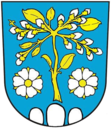Jívoví
| Jívoví | ||||
|---|---|---|---|---|
|
||||
| Basic data | ||||
| State : |
|
|||
| Region : | Kraj Vysočina | |||
| District : | Žďár nad Sázavou | |||
| Area : | 769 ha | |||
| Geographic location : | 49 ° 25 ' N , 16 ° 5' E | |||
| Height: | 550 m nm | |||
| Residents : | 282 (Jan. 1, 2019) | |||
| Postal code : | 594 51 | |||
| License plate : | J | |||
| traffic | ||||
| Street: | Křižanov - Žďár nad Sázavou | |||
| structure | ||||
| Status: | local community | |||
| Districts: | 1 | |||
| administration | ||||
| Mayor : | Miloš Holán (as of 2018) | |||
| Address: | Jívoví 40 594 51 Křižanov |
|||
| Municipality number: | 595802 | |||
| Website : | www.jivovi.cz | |||
Jívoví (German Iwowy , also Giewawe ) is a municipality in the Czech Republic . It is located eight kilometers northeast of Velké Meziříčí and belongs to the Okres Žďár nad Sázavou .
geography
Jívoví is located in the Křižanovská vrchovina ( Krischanauer Uplands ) belonging to the Bohemian-Moravian Highlands . The village extends to the left of the Jívovský creek and is surrounded by numerous ponds. To the northeast rises the Spalený kopec (595 m), in the northwest of the Holý vrch ( Naniwaberg ; 662 m) and in the west of the Špimberk (589 m). To the west of the village lies the Šebeň ( Scheben forest ). The railway line from Brno and Velké Meziříčí to Žďár nad Sázavou also passes in the west . The state road 37 from Velká Bíteš to Žďár nad Sázavou runs through the village
Neighboring towns are Tiský Dvůr and Bobrůvka in the north, Pikárec and Radkov in the northeast, Horní Hlíny, Jakubovský Dvůr and Horní Libochová in the east, Kundratice in the southeast, Křižanov and Kozlov in the south, Dobrá Voda in the southwest and Cyrilov and Radenice in the northwest.
history
The first written mention of the village belonging to the Saar Cistercian monastery took place in 1287, when Anna von Obřany donated the upper town of Cryzans and the village of Gutwasser to the monastery. The original village was in the shape of a Slavic round . During the Hussite Wars, Jan Křižanovský from Lomnitz acquired Jívoví together with the upper town of Krisans in 1422 . In 1436 the village returned to the monastery. In 1486 the Moravian Oberstlandkämmerer Vratislav von Pernstein bought the monastery Jívoví and the Krisanser upper town. He died in 1496 and Wilhelm II von Pernstein became his heir . This abolished in 1500 in Jívoví the obligation to dispense manorial wine. At the same time, the Catholic allowed the settlement of Bohemian brothers who were allowed to hold their services in the castle chapel in Krisans. He was followed in 1521 by his son Johann von Pernstein , from whom his son Adalbert / Vojtěch inherited it, who gave it to his older brother Vratislav . He had to sell Velké Meziříčí in 1552 due to excessive indebtedness and in 1560 he was no longer able to hold his Křižanover goods, which in addition to Křižanov included the villages of Jívoví, Kundratice , Sviny , Radenice , Sklené , Horní Bory and Suky . Zdenko Lhotský von Ptení became the new owner of Křižanov including Jívoví. His heirs sold the property to Jiří Volf Křinecký von Ronov. The village of Jabubovice can be traced between 1560 and 1567, and it soon became extinct. Its corridors came to Jakubovský Dvůr.
In 1610 Wilhelm Munk von Eibenschütz bought the goods. He lost her again after the battle on White Mountain . Other owners were Georg Sieghard, Diviš Vlkovský von Oubertovice, Karl Boháček von Adlerskron, from 1675 Eleonora Countess von Oppersdorff and then the Counts of Kaunitz . In 1710 Johann Wenzel Ritter von Schwalbenfeld acquired the rule of Krizanau, to which Gutwasser had been added, for 180,000 guilders. His sons sold the property to the Cistercian monastery in Saar in 1726 . In the course of the Josephine reforms, the monastery was dissolved and the rule was sold to Karl Endsmann von Ronow for 234,465 guilders in 1784. Around 1800 there was mining for iron ore not far from Jakubovský Dvůr.
After the abolition of patrimonial Jívoví formed from 1850 a district of the minor town Křížánov in the district of Velké Meziříčí . The industrial family Joseph, Wilhelm and Moritz Teuber bought the manorial goods in 1865. In 1874 the political municipality of Jívoví was established. After the Second World War, the Teuber family was expropriated. At the beginning of 1961 the Okres Velké Meziříčí was dissolved and the municipality was assigned to the Okres Žďár nad Sázavou . In 1976 it was incorporated into Křížánov. The community has existed again since 1990.
Local division
No districts are identified for the municipality of Jívoví. The Jakubovský Dvůr ( Jakubowitzhof ) single-layer belongs to Jívoví .
Attractions
- Šebeň nature reserve with forest ants population
- Chapel on the village square, built in 1830
- Chapel on the road to Křižanov, built in 1878
- Jakubovský Dvůr, the detached courtyard on a chain of ponds and the mill built on a dam can be traced back to 1447
- two atonement stones at Jakubovský Dvůr

